
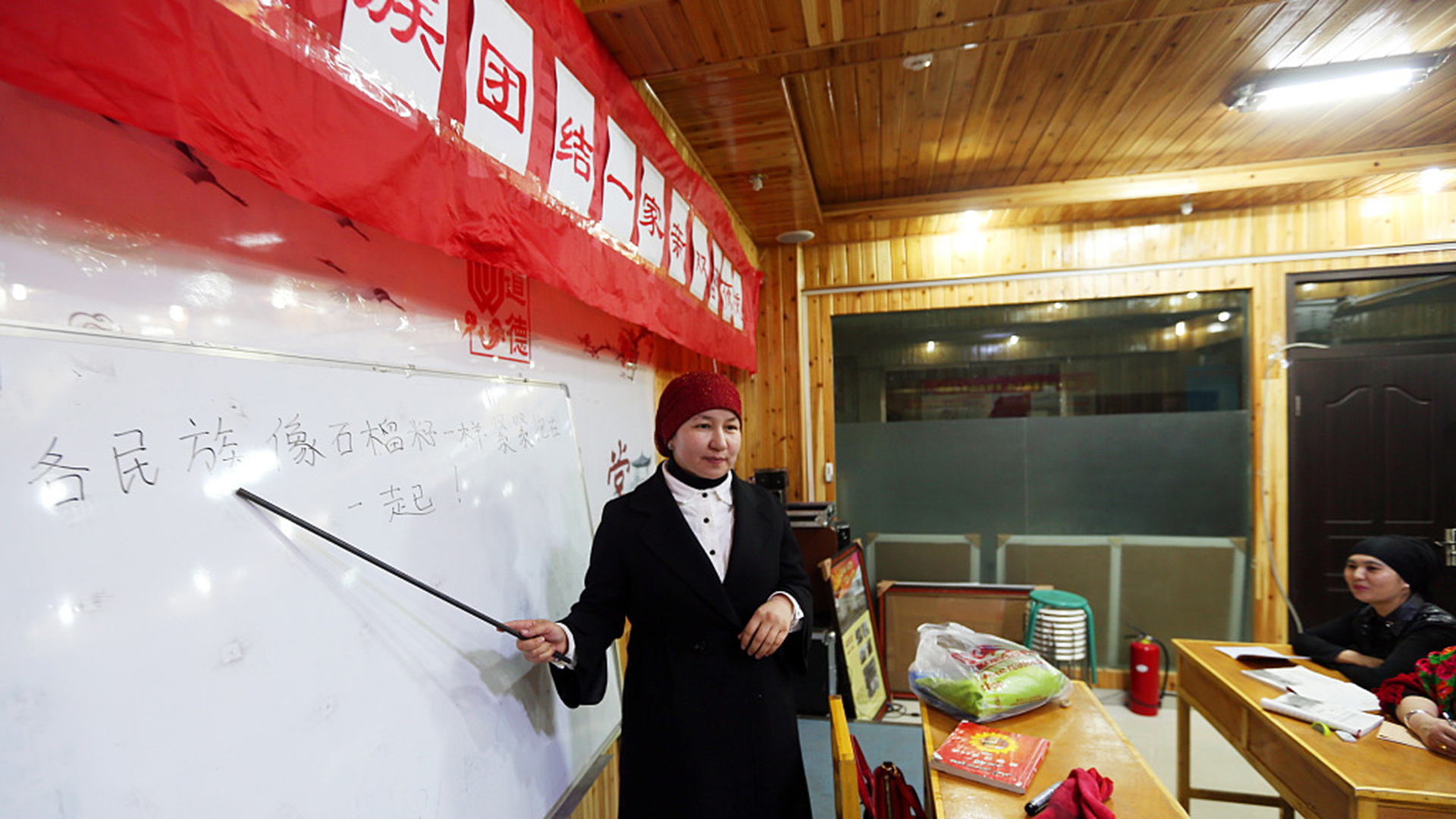
China issued a white paper on vocational education and training in Xinjiang on Friday.
The white paper, published by the State Council Information Office, says that terrorism and extremism are the common enemies of humanity and the fight against them is a shared responsibility of the international community.
Full text of China's white papar on vocational education and training in Xinjiang
It is a fundamental task of any responsible government, acting on basic principles, to remove the malignant tumor of terrorism and extremism that threatens people's lives and security, to safeguard people's dignity and value, to protect their rights to life, health and development, and to ensure they enjoy a peaceful and harmonious social environment, according to the document.
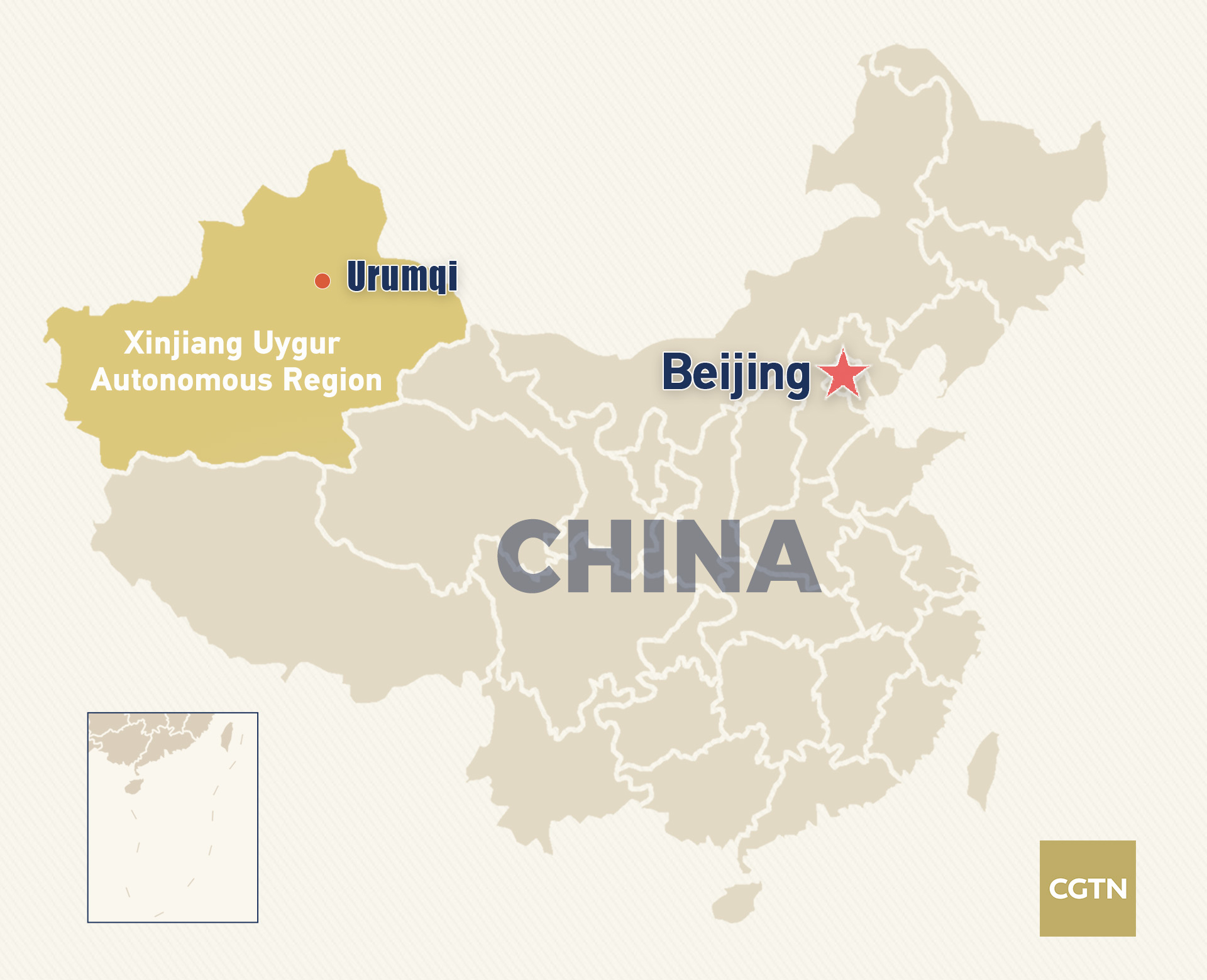
Read more:
All you need to know about China's white paper on Xinjiang history and culture issues
The white paper has six chapters: urgent needs for education and training; law-based education and training; content of education and training; protection of trainees' basic rights; remarkable results in education and training; and experience in countering extremism.
Education and training in Xinjiang is practiced in line with the spirit and requirements of the rule of law in China, according to the white paper.

Xinjiang needs education, training urgently
Terrorism and extremism have a long history in Xinjiang. In an attempt to split China, separatist and religious extremist forces advocated religious extremism and carried out a series of terrorist activities. For years, religious extremism continued to make inroads into Xinjiang, resulting in incidents of terrorism, said the white paper titled Vocational Education and Training in Xinjiang.
Faced with this severe and complex problem, Xinjiang has upheld the principle of addressing both the symptoms and root causes in its fight against terrorism and extremism, by striking hard at serious terrorist crimes, and by educating and rehabilitating people influenced by religious extremism and involved in minor violations of the law, it said.
In accordance with the law, Xinjiang has established vocational education and training centers to offer systematic education and training in response to a set of urgent needs: to curb frequent terrorist incidents, to eradicate the breeding ground for religious extremism, to help trainees acquire a better education and vocational skills, find employment, and increase their incomes, and most of all, to safeguard social stability and long-term peace in Xinjiang, the white paper stated.
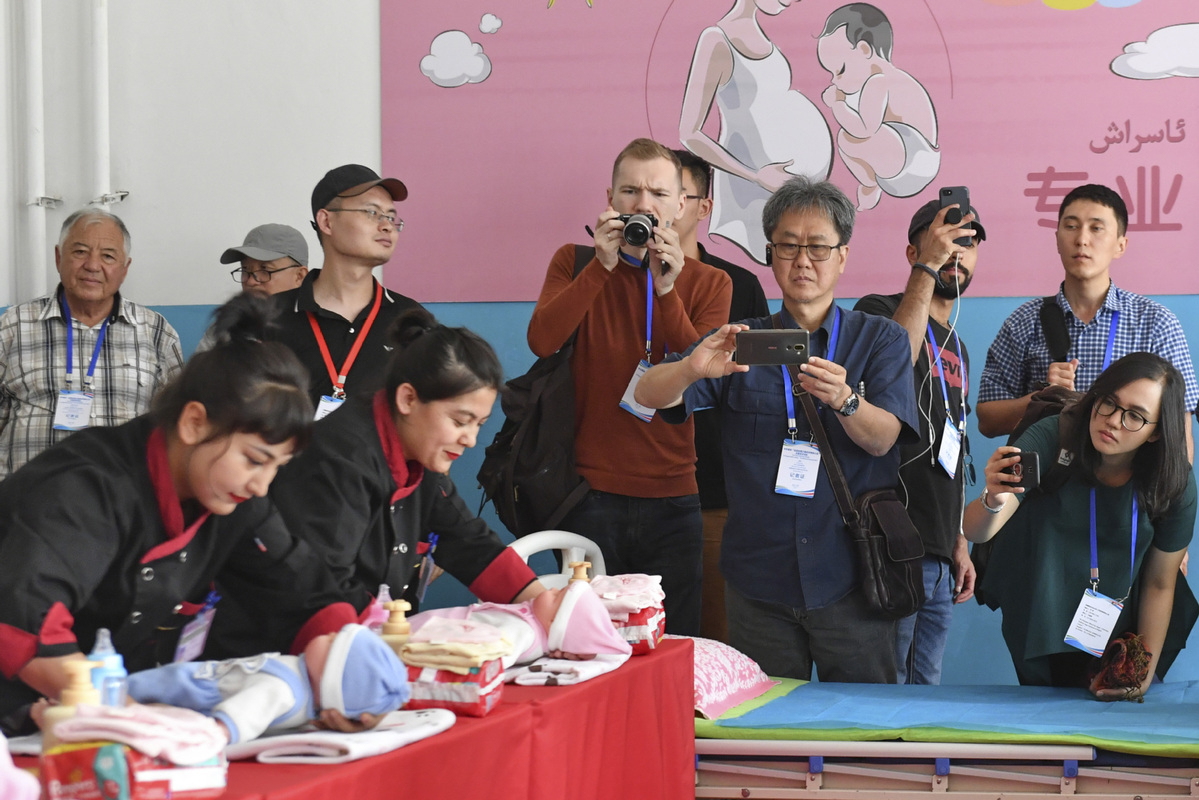
A group of reporters from 24 countries visit a vocational educational center in Moyu County, Xinjiang Uygur autonomous region, northwest China, July 22, 2019. /Xinhua Photo
Xinjiang's education, training centers never interfere with freedom of religious belief
Education and training centers in Xinjiang never interfere in the trainees' freedom of religious belief nor make any attempts to have the trainees change their religious beliefs, said the white paper.
Through step-by-step teaching of laws and regulations, policies on ethnic and religious affairs and religious knowledge, and by exposing the damage caused by terrorism and religious extremism, the centers give trainees a full and accurate understanding of the national policy of freedom of religious belief, the white paper read.
The education and training centers in Xinjiang respect the trainees' rights to use their own ethnic spoken and written languages when offering standard Chinese courses, said the paper.
To meet the needs of fighting terrorism and extremism, these centers deliver a curriculum that includes standard spoken and written Chinese, understanding of the law, vocational skills and deradicalization, the document stated.
Improving the trainees' command of standard Chinese helps them to learn about science and technology, acquire vocational skills, seek work in other locations, communicate with other ethnic groups, and adapt better to life in modern society, subject to the condition that their right to use their own ethnic languages is respected, the white paper said.
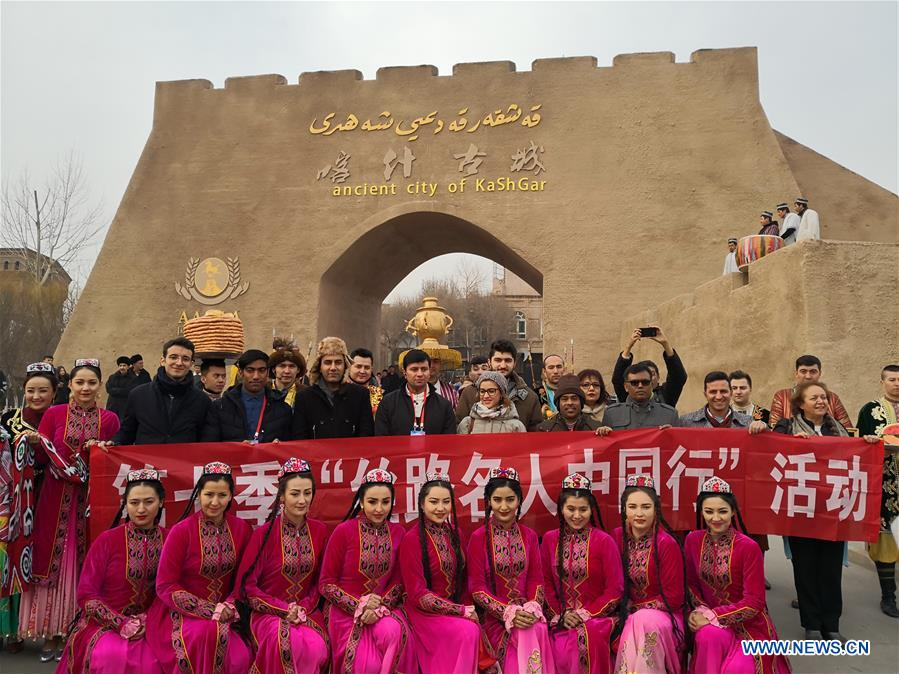
Media representatives of the Silk Road Celebrity China Tour attend a ceremony to enter the ancient city of Kashgar, northwest China's Xinjiang Uygur Autonomous Region, January 13, 2019. /Xinhua Photo
Trainees' basic rights protected
Education and training in Xinjiang are an important measure to help trainees break free from ideas of terrorism and religious extremism, not a measure to limit or circumscribe a person's freedom, said the white paper.
The personal freedom of trainees at the education and training centers is protected in accordance with the law, according to the document. The centers employ a residential education model which allows trainees to go back home on a regular basis and ask for leave to attend personal affairs. The trainees also enjoy the freedom of correspondence.
The regulations, curriculum, and menus at the centers all use local ethnic languages as well as standard Chinese. The customs of all ethnic groups are fully respected and protected, and a variety of nutritious Muslim food is provided free of charge, according to the white paper.
The centers practice separation of education and religion in management, which means trainees should not organize or take part in religious activities there, but they can decide on their own whether to do so on a legal basis when they get home.
No terrorist incidents in Xinjiang for three years
No terrorist incidents have occurred in Xinjiang for nearly three years since the education and training started, and the overall situation in society continues to be stable, according to the white paper.
The white paper said that as the infiltration of religious extremism has been curbed, public order and security have returned to society, where equality, solidarity and harmony among ethnic groups and religions have prevailed, and people are enjoying peace and stability.
The education and training has won general support, according to the white paper. The trainees gain a thorough understanding of the true nature and perils of terrorism and religious extremism. They thank education and training for turning them back from the way of terrorist crimes and helping them break free from the spiritual shackles of religious extremism.
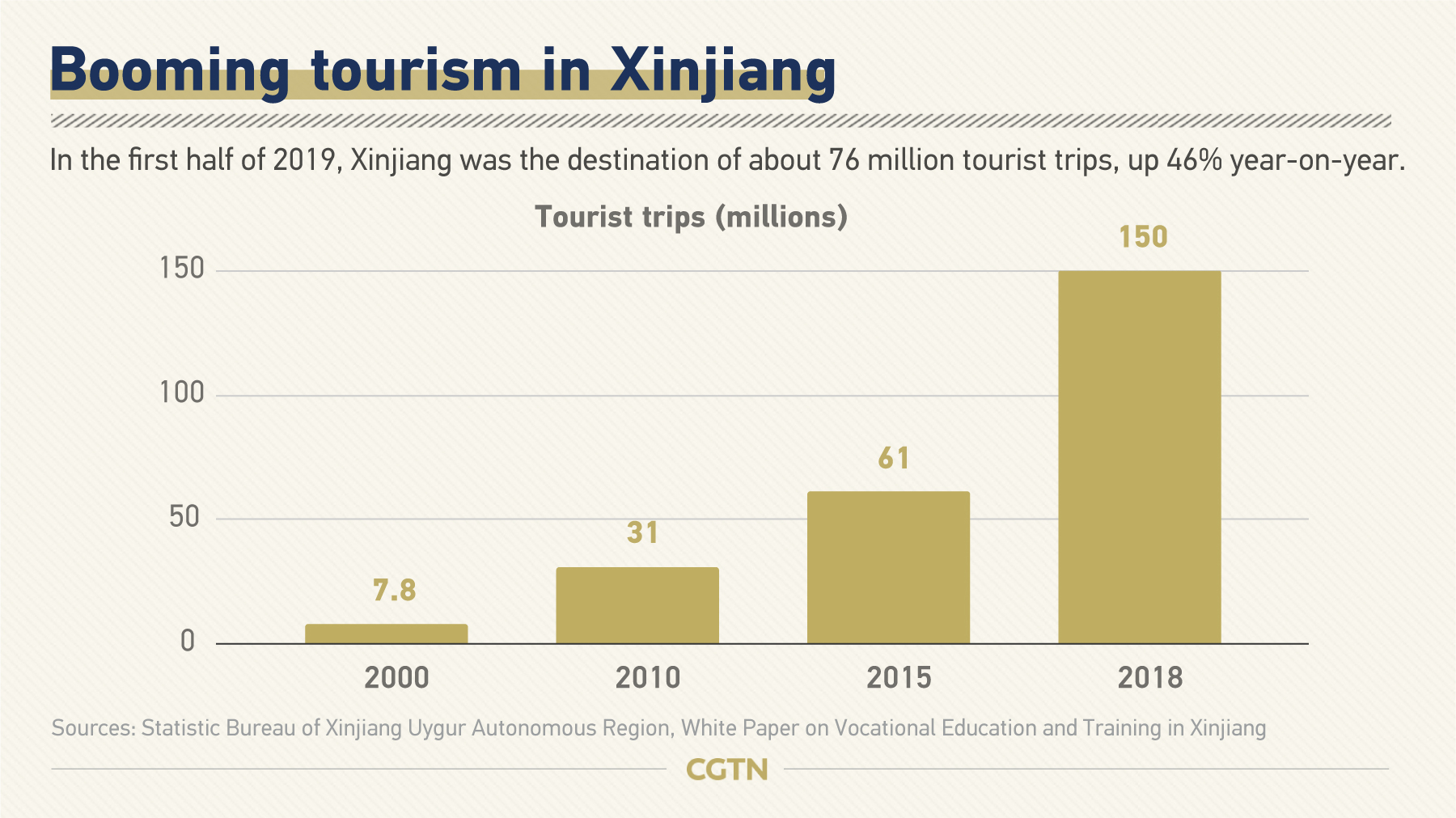
International community makes positive comments on Xinjiang's education efforts
The international community has made positive comments on the education and training efforts of Xinjiang, according to the white paper.
Since the end of December 2018, nearly 1,000 people including foreign diplomatic envoys to China, UN officials, Geneva-based senior diplomats of various countries, as well as more than 40 groups (or delegations) from political parties, civil society organizations, news media, and religious organizations of various countries have visited Xinjiang, according to the white paper.
Through field trips, many have realized the truth and understood the urgency, necessity, legitimacy and rationality of carrying out education and training. They have all recognized that violent and inhumane terrorist activities in the region, provoked by religious extremism, were causing outrage, the white paper said.
At its 46th session, the Council of Foreign Ministers of the Organization of Islamic Cooperation adopted a resolution commending China's efforts in providing care to its Muslim citizens, the document added.
The white paper also cited multiple reports published by foreign journalists who have conducted interviews in the education and training centers.
The journalists have published stories that reflect the true role of the centers and express their understanding, approval and support for the education and training programs in Xinjiang, the white paper said.
Xinjiang's vocational education and training contributes to international actions against terrorism and extremism
The vocational education and training programs carried out in Xinjiang have achieved notable results and contributed experience to international actions against terrorism and extremism, said the paper.
In countering terrorism and extremism, Xinjiang draws on the experience of other countries, and provides people influenced by terrorist and religious extremist teachings with education in standard spoken and written Chinese, an understanding of the law, and training in vocational skills, according to the white paper.
The white paper describes how these efforts have eradicated extremist thoughts, delivered widely recognized results, helped to safeguard social stability in the region, and protected the environment for the healthy development of religions.
"Some people, for reasons of ideological prejudice or other ulterior motives, are doing all they can to blacken the reputation of Xinjiang's vocational education and training centers. Their censure of Xinjiang's huge effort in countering terrorism and extremism will be firmly rejected by the Xinjiang people," read the document.
A number of countries, organizations and individuals apply double standards in their approach to terrorism and extremism, which will in effect shield and incite terrorism and extremism, the white paper noted.
(With inputs from Xinhua)

Copyright © 2018 CGTN. Beijing ICP prepared NO.16065310-3
Copyright © 2018 CGTN. Beijing ICP prepared NO.16065310-3